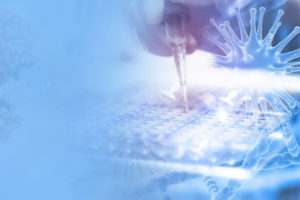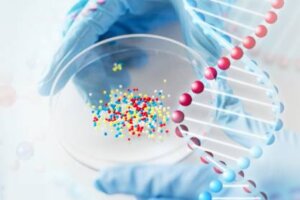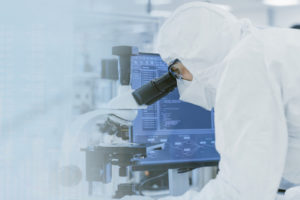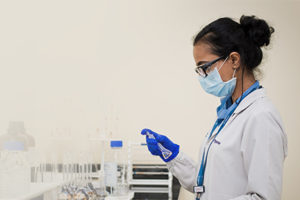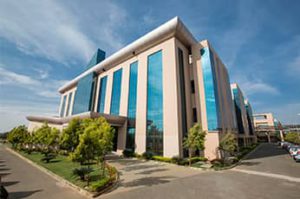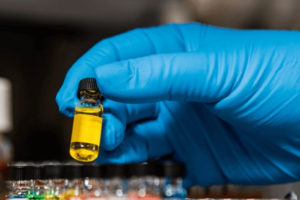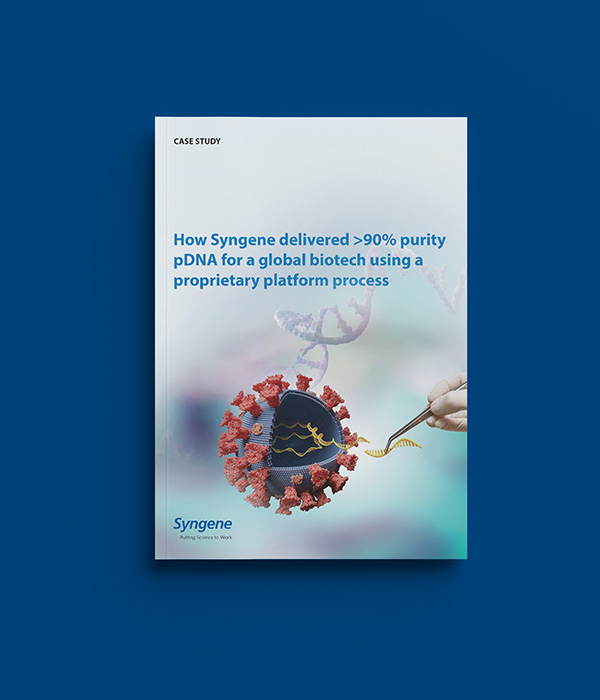The requirement
The client is a global pharmaceutical company that develops innovative and advanced therapeutics for various diseases. The company was looking for a partner for the commercial production of high-quality pDNA and then mRNA for one of its biologics programs. The company decided to partner with Syngene since we had the expertise and capacity to supply pDNA and mRNA as per their specifications.
Background
Almost all gene therapies, many immunotherapies (RNA-based therapies, viral vectors, cell and gene therapies), and modern vaccines rely on plasmid DNA as the key starting material or API. However, producing pDNA for advanced therapies poses numerous manufacturing challenges.
The challenge
The production of pDNA requires a robust, reproducible, and scalable process that consistently maintains pDNA quality. In addition, the production process requires continuous monitoring of important parameters such as agitation, pH, temperature, dissolved oxygen and carbon dioxide, pressure, and foam formulation. Production monitoring is necessary to ensure that the biological process remains within the defined operating conditions to quickly identify and correct any deviations. This helps to optimize cell growth, pDNA yield, and product quality while minimizing the risk of process disruptions or failures. Intensive monitoring also helps to ensure process reproducibility and regulatory compliance to guarantee final pDNA quality and safety.
Other challenges in pDNA manufacturing include high viscosity, shear sensitivity, and the large size of the pDNA molecule. The latter leads to purification and stability problems. Addressing these challenges to meet large-scale manufacturing requirements requires careful process design and optimization. Only then can one ensure consistent, high-quality pDNA production.
Upstream and Downstream alliance for pDNA production
As a first step in the upstream process, we developed a platform process to generate high-titer pDNA. The process involves a high cell-density fed-batch fermentation process with a semi-defined basal salt medium. Through this, we established the ability to scale pDNA production to 50L seamlessly.
Once the program reached the downstream stage, optimizing the lysis step to purify pDNA became a challenge. This is due to the complexity of the pDNA synthesis and harvesting process, which leads to the generation of various impurities such as nicked, open circular, and linear plasmid forms, breakdown of genomic DNA, etc. Further, optimizing the lysis step is imperative to achieving the overall success of the downstream process. We evaluated several design-of-experiments (DOE) and statistical approaches to overcome this challenge. Based on the findings, we then defined the optimum lysis process, which could be performed in a reduced time frame. Further, we introduced a cell lysis vessel to allow control of critical parameters such as lysis pH, agitation, and temperature.
The new platform process was initially developed at a laboratory scale and later scaled to accommodate manufacturing batches. The downstream process was based on anion exchange chromatography (AEX) and affinity chromatography with intermediate tangential flow filtration and another filtration step for buffer exchange and conditioning.
In this process, development work first begins in 2L bioreactors. It is then moved to 10L bioreactors and finally to 50L reactors. We refined the process at each stage to make it robust, consistent, and scalable. This process was further evaluated and verified with plasmid sizes ranging from 2 to 14 kilobases. We also evaluated the process to ensure the production of pDNA of high titers with consistent quality and yield. This resulted in Syngene providing the required pDNA at 50L scale to the customer while ensuring a high purity of over 90%.
Development and set-up of analytical methods
Developing reliable analytical methods for pDNA quantification, including assessment of purity and homogeneity, is essential in any biologics program. Syngene deployed fast, reliable, accurate, and inexpensive analytical methods to meet purity levels at unit-level operations.
We first determined the A260 and A280 nm absorbance of samples using a spectrophotometer to evaluate the quantity and purity of pDNA. We used agarose gel electrophoresi (AGE) to determine the presence of different forms of a given plasmid. However, because AGE is semi-quantitative and also time-consuming, we developed the AEX method.
We used the AEX method to quantify and determine the purity of the plasmid samples which gives more quantitative results. Using this method, we were able to obtain more than 90% super-coiled (SC) form in our platform process. We then analyzed the product using standard molecular biological techniques to detect contaminants such as residual host cell DNA, residual RNA, residual host cell proteins, and endotoxins. All these efforts produced highly pure pDNA at 50L scale for the customer’s mRNA program.
Conclusion
The project brings to the forefront Syngene’s expertise in pDNA manufacturing across stages from discovery to the clinic. We successfully delivered pDNA at 50L scale to the customer while maintaining a high purity of over 90%, in compliance with regulatory requirements. We also produced small-scale batches of mRNA for the customer as per GMP standards. We now look forward to more such collaborations with bio-pharmaceutical companies to accelerate the progress of their mRNA, viral vectors, and DNA vaccine programs.
Syngene’s proprietary platform process for pDNA streamlines and optimizes pDNA production while ensuring consistency and quality at every scale. We can manufacture pDNA for 2L, 10L, and 50L scales and also offer cGMP scale pDNA of up to 500L while adhering to the highest quality standards.
To learn more about our pDNA-mRNA services, contact our experts.
